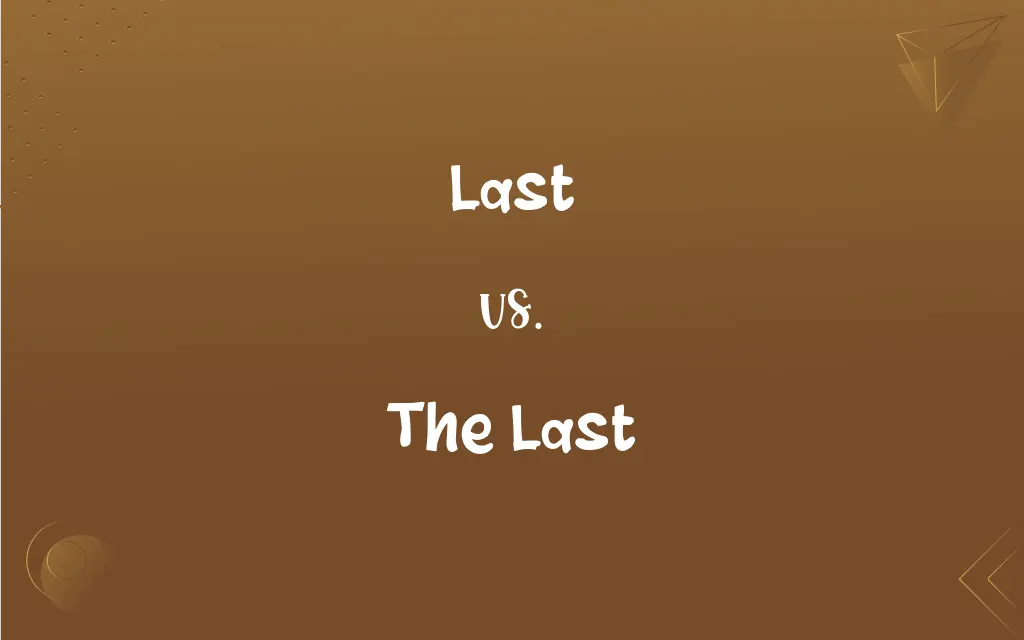Last vs. The Last: What's the Difference?
Edited by Aimie Carlson || By Janet White || Published on February 4, 2024
"Last" refers to the final item in a sequence, while "the last" specifically denotes the most recent or final one in a particular context.

Key Differences
"Last" is used to indicate the final item or person in a sequence without specifying a particular group. "The last," however, refers to the final item within a known or specific group.
In temporal terms, "last" can denote the final point in time, while "the last" is used to specify the most recent occurrence within a known timeframe.
"Last" often signifies endurance, as in lasting for a long time. "The last," on the other hand, is used to emphasize the position of being final in a specific series.
In the usage of ordinal numbers, "last" is used alone, but "the last" is followed by an ordinal number, specifying a particular position.
"Last" can be a verb meaning to continue over time, whereas "the last" is always a noun or adjective, referring to the final element.
ADVERTISEMENT
Comparison Chart
Definition
Final in a sequence
Final in a specific context
Temporal Reference
Final in time
Most recent or final in known timeframe
Usage as Part of Speech
Can be a verb or adjective
Used as a noun or adjective
In Ordinal Context
Used alone
Used with specific ordinal numbers
Implication
General finality
Specific finality within context
ADVERTISEMENT
Last and The Last Definitions
Last
Least likely or suitable.
He is the last person I would suspect.
The Last
Used before a noun to specify it as the final one.
The last chapter of the book was thrilling.
Last
To continue over a period of time.
The meeting lasted two hours.
The Last
The most recent in a specific context.
That was the last time I saw her.
Last
Most recent in time.
He last visited New York in 2010.
The Last
The least expected or desired.
She was the last person he expected to see.
Last
Final in sequence or order.
She was the last to leave the party.
The Last
The final one in a specific series.
The last episode of the series airs tonight.
Last
Remaining after others are gone.
The last slice of cake was eaten.
The Last
Referring to the ultimate in a specific list.
In the list of suspects, he was the last.
Last
Being, coming, or placed after all others; final
The last game of the season.
FAQs
What does "last" mean in a sequence?
"Last" means the final item or person in a sequence, without reference to a specific group.
Is "the last" used with numbers?
"The last" is often used with ordinal numbers to specify a particular position in a series.
Can "last" be a verb?
Yes, "last" can be a verb meaning to continue or endure over time.
How does "the last" emphasize finality?
"The last" emphasizes finality by specifically denoting the end point in a known series or timeframe.
Does "the last" imply something will not happen again?
"The last" often implies the most recent occurrence, but it doesn't necessarily mean it won't happen again.
Does "last" have different meanings in different contexts?
Yes, "last" can have different meanings depending on whether it's used in terms of time, order, or duration.
Does "last" always refer to time?
No, "last" can refer to the final item in order or the most recent time, but not exclusively to time.
How is "the last" used differently?
"The last" refers to the final item in a specific, known context or group.
Can "the last" refer to people?
Yes, "the last" can refer to the final person in a specific context or group.
Is "last" used in expressions?
Yes, "last" is used in many expressions, like "last but not least."
Can "last" refer to the only remaining item?
Yes, "last" can refer to the only remaining item, as in "the last piece of bread."
Can "last" imply the least preferred option?
Yes, "last" can imply the least preferred or desired option, as in "the last resort."
Can "last" indicate durability?
Yes, when used as a verb, "last" can indicate how long something endures or lasts.
How is "the last" used in storytelling?
In storytelling, "the last" often denotes the final part or conclusion of a story.
Is "last" used in a negative sense?
"Last" can have a negative connotation, as in "the last thing I want."
Is "last" used in sports terminology?
Yes, "last" is used in sports, often to refer to the final position or the most recent game or match.
Can "the last" be used to express surprise?
Yes, "the last" can express surprise, as in "the last person I expected to see."
How is "the last" used in historical references?
"The last" in historical references typically denotes the final event or person in a historical sequence.
Does "the last" carry a sense of importance?
Sometimes "the last" carries a sense of importance or emphasis, particularly in phrases like "the last chance."
Is "the last" commonly used in everyday conversation?
Yes, "the last" is commonly used in everyday conversation to refer to the most recent or final item in a specific context or series.
About Author
Written by
Janet WhiteJanet White has been an esteemed writer and blogger for Difference Wiki. Holding a Master's degree in Science and Medical Journalism from the prestigious Boston University, she has consistently demonstrated her expertise and passion for her field. When she's not immersed in her work, Janet relishes her time exercising, delving into a good book, and cherishing moments with friends and family.
Edited by
Aimie CarlsonAimie Carlson, holding a master's degree in English literature, is a fervent English language enthusiast. She lends her writing talents to Difference Wiki, a prominent website that specializes in comparisons, offering readers insightful analyses that both captivate and inform.







































































